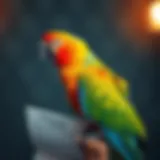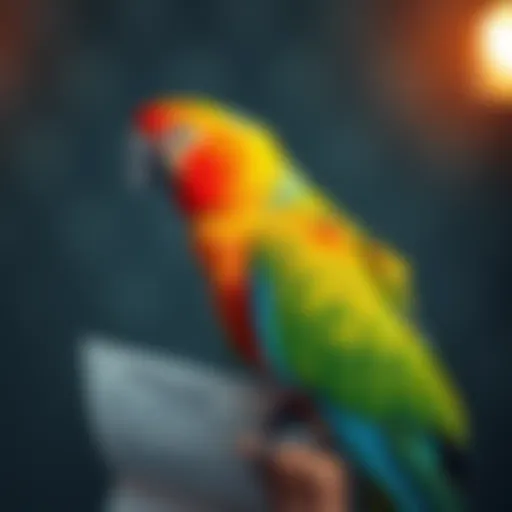Nourishing Your Parrot: A Complete Feeding Guide
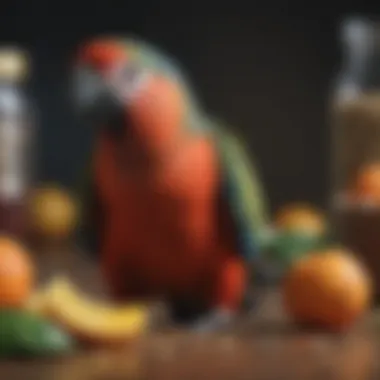

Intro
Feeding your pet parrot isn't just about tossing some seeds in a bowl and calling it a day. It requires understanding their specific needs to thrive. Parrots, like any pet, need a balanced diet tailored to their species and individual health requirements. In this guide, we explore the essentials of avian nutrition, debunk myths, and provide practical advice for creating a sought-after food plan for your feathered companion. As we dive into the intricacies of their diet, keep in mind that a well-fed parrot is not only healthier but also happier. So let’s feather our nests with knowledge and ensure our chirpy friends live their best lives.
Avian Care Basics
Importance of Proper Nutrition
Nutrition plays a crucial role in the overall health of your parrot. Just like humans, birds flourish when they are fed a well-rounded diet. This isn't just a matter of giving them the same seed mix day in and day out. In fact, a diet solely based on seeds can lead to serious health issues like obesity or liver disease. Instead, it's vital to incorporate a variety of fresh fruits, vegetables, and high-quality pellets to ensure your bird doesn't just survive, but truly thrives.
Understanding Bird Species and Their Needs
Not all parrots are cut from the same cloth. From the small Budgerigar to the grand Macaw, each bird species comes with its own unique dietary requirements. For instance, a Cockatoo may require more protein and fat than a Lovebird. Understanding these differences will keep your pet engaged and healthy. The more informed you are about their individual needs, the better equipped you'll be to make feeding decisions that support their well-being.
Basics of Birds Habitat Setup
Creating a comfortable habitat for your parrot goes hand-in-hand with nutrition. A clean cage free of droppings and old food is fundamental. Positioning food and water dishes within reach encourages good eating habits. Additionally, providing space for foraging can stimulate their natural instincts, prompting them to engage both mentally and physically. This means including toys and perches that facilitate exploration and exercise.
Grooming and Hygiene Tips
Colorful feathers can only stay vibrant with proper care. Regular grooming is essential in preventing matting and ensuring your bird maintains good health. This includes nail trimming and regular baths—some parrots enjoy misting, while others prefer a shallow dish of water. Consistent hygiene not only keeps your parrot looking good but also minimizes the risks of skin infections.
"A healthy diet paves the way for a happy, energetic parrot. Investing time in understanding your parrot's needs is a feather in your cap of responsibilities."
By focusing on these basic aspects of avian care, you lay the groundwork for a thriving relationship with your pet. Keep a keen eye on their behaviors and reactions to different foods, and with a bit of observation, you'll soon be well on your way to mastering home feeding.
As we move forward, the next sections will elaborate on interacting with your pet bird, enhancing their emotional well-being, ensuring their health and safety, and even throwing in some quirky bird facts. Let's keep our wings flapping and dive deeper into the colorful world of avian care.
Prelude to Parrot Nutrition
Understanding the nutritional needs of parrots is more than just a means to keep them alive; it’s essential for their overall well-being. Proper nutrition reflects directly on their health, vitality, and mood. Think about it: a parrot that gets the right food is likely to be more active, sociable, and less prone to diseases. This section emphasizes the significance of providing a varied diet, which closely mirrors what wild parrots consume. The benefits of knowledge in parrot nutrition are like gold—worth their weight when it comes to nurturing healthy feathered friends.
Understanding Avian Dietary Needs
Every parrot species comes with unique dietary needs, which depend on their origin and natural habits. In the wild, parrots often forage for hours, munching on everything from seeds and fruits to nuts and flowers. When you bring a parrot home, you're responsible for replicating that variety as much as possible.
Why is diversity important? Well, without a mix of foods, there's a risk of deficiencies or excesses. Some parrots might thrive on a seed-heavy diet, whereas others may need more fruits or greens. Failing to recognize this could lead to health issues down the road.
To make the right choices, it’s good to do your homework on the specific species. For instance, African Greys need more calcium in their diets, while Eclectus parrots thrive on higher fruit counts due to their digestive systems being adapted to different natural foods. A commonly valid approach is to consult with an avian nutrition guide, or even better, chat with a veterinarian about what your specific parrot needs.
The Importance of a Balanced Diet
The term ‘balanced diet’ often gets thrown around but what does it truly entail in the context of parrot care? In this realm, balance means having a proper ratio of seeds, pellets, fruits, nuts, and vegetables in their meals.
A diet too high in fats from seeds or nuts can cause issues like fatty liver disease or obesity. Conversely, if the diet leans too heavily on pellets, then essential nutrients from fresh foods might be missed. Parrots are like little chefs; they need a menu that’s as varied as their personalities!
"A diverse diet for your parrot is akin to dressing a stage for a performance: each element plays its part in creating a vibrant show."
To achieve a balanced diet, consider rotating food choices daily. This can secure a wide range of vitamins and minerals, keeping their bodies nourished and their spirits high. Engage with their taste buds! Some favorites might be sweet potatoes, kale, and broccoli. Also, remember that freshness is key. Serving dishes should be prepared daily to ensure maximum nutrient consistency.
In sum, understanding these nuances of parrot nutrition makes feeding your pet not just a chore but instead an enriching experience. Bringing knowledge into the feeding routine is a stepping stone towards fostering a bond that withstands time—not only nurturing their health but enriching your companionship.
Core Components of a Parrot's Diet
Understanding the core components of a parrot's diet is fundamental to ensuring your feathered companion thrives. Each element of their diet contributes to their overall health and energy levels. Parrots, much like us, require a spectrum of nutrients to remain vigorous. A well-rounded diet not only fuels their physical activities but also supports their mental well-being. Here, we will break down the main components: seeds and grains, fruits and vegetables, pellets, and nuts and treats. Each plays a distinct role in maintaining a balanced dietary routine for your bird.
Seeds and Grains
Seeds and grains are often the first foods that come to mind when considering parrot diets. However, understanding their role is crucial. These are mainly energy sources, high in fats and carbohydrates. Sunflower seeds, millet, and canary seeds may be favorites among many parrots, but relying solely on these can lead to deficiencies in essential nutrients. They may fill your parrot's belly, but they won't deliver all the vitamins and minerals they require.
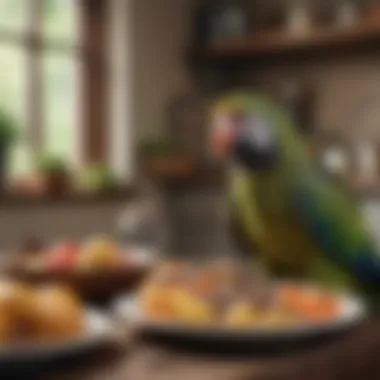

Incorporating a variety of seeds and grains is key. For instance, while a handful of sunflower seeds makes a delightful treat, it’s important to balance it with less fatty options like millet. As a rule of thumb, seeds should comprise about 30-50% of their overall diet, supplemented with other food types for optimal health.
Fruits and Vegetables
Fruits and vegetables are absolutely vital for your parrot's diet. Not only do they provide essential vitamins, but they also add variety and fun. Think about bright, colorful offerings like carrots, leafy greens, apples, and blueberries. Not all fruits and vegetables are created equal, however. Certain ones can be harmful or contain substances that can upset their digestion.
Moreover, fresh produce encourages hydration, an often-overlooked aspect of feeding. Ensure that you wash fruits and veggies thoroughly to eliminate any pesticide residue. Just make sure to chop them into manageable pieces appropriate to your parrot's size. A mix of fruits and vegetables should ideally make up 50% or more of your parrot's daily intake, promoting vibrancy in both color and health.
Pellets: A Convenient Alternative
Pellets are sometimes touted as a convenient alternative to mixed seed diets. These manufactured foods, designed to contain a balanced ratio of nutrients, are formulated to meet dietary needs without excessive fats. Look for high-quality brands with no artificial colors or preservatives. They come in different shapes and sizes, often designed to appeal to specific species of parrots.
While pellets are convenient, they should not be the sole food source. Mixing pellets with seeds, fruits, and vegetables creates a varied diet. A smart approach is to start with a 25-40% portion of pellets in their meal to ensure balanced nutrition. Remember, introducing pellets must be gradual, as some parrots can be finicky eaters and may need time to adjust to new textures and flavors.
Nuts and Treats
Nuts and treats are a bit like dessert in the world of parrot feeding. They bring excitement and can be used as positive reinforcement during training. Almonds, walnuts, and hazelnuts are excellent options, providing healthy fats and protein. However, moderation is key; too many nuts can lead to weight gain and fat-related health problems.
Because nuts are dense in calories, they should only be a small part of the diet, roughly 10-15%. Offering nuts unsalted and raw ensures they get the best nutritional value. You can even make a game out of it, hiding treats in foraging toys to stimulate their natural instincts while keeping them engaged.
Remember, a diverse diet reflects a vibrant and healthy parrot. Each food group has unique belly and feather-boosting benefits.
In summary, a comprehensive understanding of these core components is essential for anyone looking to nurture their parrot effectively. Creating an amalgamation of grains, seeds, fresh produce, pellets, and a few yummy nuts can result in a flourishing and happy companion.
Food Safety for Parrots
Ensuring food safety for your parrot is an essential part of their overall health and well-being. Not only do parrots require a balanced diet to thrive, but the food they consume must also be free from contaminants and hazards. This means that as a bird owner, being knowledgeable about what is safe for your feathered friend to eat is crucial. By prioritizing food safety, we can help prevent health complications that can arise from feeding unsafe items, contributing to a happier and longer life for these colorful companions.
Identifying Safe Foods
Identifying safe foods for your parrot involves a mix of research and observation. Here are some guidelines to help you along the way:
- Fresh Fruits and Vegetables: Offer a variety of fresh produce, such as apples, carrots, and leafy greens. Make sure to wash them thoroughly to remove any pesticides or harmful substances.
- Quality Pellets: Invest in high-quality pellets specifically designed for parrots. These products often contain balanced nutrients and are formulated without harmful additives.
- Whole Grains and Seeds: Foods like quinoa, oats, and certain seeds can be beneficial. Choose organic options when possible to ensure they are free from chemicals.
Always monitor how your parrot reacts to new foods. If they show signs of aversion or distress, it might be wise to avoid that item in the future. Remember, what works for one parrot might not suit another.
"A well-fed parrot is not only healthy but also happy, making it essential to pay attention to what goes into their beak."
Foods to Avoid
Certain foods can be hazardous for parrots, and becoming familiar with these is just as critical as knowing what is safe. Here’s a short list of items to steer clear of:
- Avocado: Contains a substance called persin, which is toxic to birds.
- Chocolate and Caffeine: Both can cause serious health issues, even in small amounts.
- Onions and Garlic: These foods can damage red blood cells in parrots, leading to anemia.
- High-fat and Salty Foods: Such as those found in chips or processed snacks, can lead to obesity and other serious health conditions.
- Pit Fruits: The pits of peaches, cherries, and plums can pose choking hazards or release toxic substances when crushed.
In summary, maintaining food safety not only protects your parrot but also enriches their eating experience. When in doubt, it's always best to consult with an avian veterinarian for tailored advice related to your parrot's specific dietary needs.
Meal Preparation and Serving
Meal preparation and serving are pivotal in ensuring that your parrot receives the best possible nutrition at home. Parrots are not like the average house pet; they have specific dietary requirements that need thoughtful consideration. Careful planning and preparation of meals can lead to healthier, happier birds. Moreover, the way food is served can affect a parrot’s eating habits, preferences, and overall stress levels during mealtime.
Benefits of Meal Preparation:
- Nutritional Balance: Preparing fresh foods allows caretakers to control the nutritional balance of the meals offered. For instance, by combining leafy greens with fruits and lean proteins, you can create a varied diet that mirrors a parrot's natural foraging behavior.
- Encouraging Natural Behaviors: A well-thought-out meal presentation can encourage your parrot to engage in natural behaviors, such as foraging and exploring, which are vital for their mental stimulation. For example, offering treats hidden in crumpled paper or small foraging devices can keep your parrot entertained and active.
- Freshness: Parrots thrive on fresh foods. Preparing meals daily ensures they consume ingredients at their peak nutritional value, reducing the risk of spoiled food, which could be harmful.
Considerations in Meal Preparation:
- Hygiene: It's crucial to maintain cleanliness while preparing food. Always wash hands and utensils before touching food to prevent contamination.
- Ingredient Compatibility: Mixing certain fruits and vegetables can enhance flavors but be sure to avoid combinations that might upset your parrot’s digestion. Some birds might have peculiar dislikes or preferences, so it may take some experimentation.
"Feeding is as much about the quality of food as it is about the manner of serving it; both hold significant sway over a parrot's health and disposition."
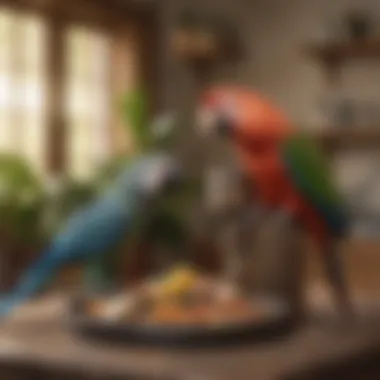

Preparing Fresh Foods
Fresh foods are the cornerstone of a parrot's diet. They provide necessary vitamins and minerals, and many parrots develop a preference for fresh things over processed options. When preparing fresh foods, it's essential to rinse them thoroughly to remove any pesticides or contaminants. Additionally, cutting fruits and vegetables into manageable pieces can facilitate easy eating.
- Variety is Key: Introducing a range of fruits and vegetables keeps your parrot interested in their meals. Try different textures and colors; bright options like carrots, sweet potatoes, and vibrant berries can be quite enticing.
- Seasonal Ingredients: Using seasonal produce not only benefits your parrot’s health but also supports local farmers and reduces the environmental impact of transporting out-of-season fruits and vegetables.
Portion Control for Optimal Health
Portion control plays a crucial role in managing a parrot's weight and overall health. Overfeeding can lead to obesity, which is a significant concern among pet parrots. Tailoring portions according to individual needs ensures optimal wellness.
- Understanding Needs: Each parrot is different and factors like age, size, and activity level come into play when determining food amounts. Big parrots generally require more food than smaller ones.
- Daily Recommendations: Most avian experts suggest offering about 1/4 cup of pellets, along with an additional daily serving of fruits and vegetables based on the bird’s body weight. Use this as a guideline, but also watch your parrot's behavior and adjust as needed.
- Monitoring Intake: Keep an eye on how much your parrot consumes. If food is consistently left behind in its dish, you might be overestimating their portion sizes. Conversely, if they're asking for more, it may be time to increase portions a bit.
Proper meal preparation and portion control can transform a routine feeding time into an enriching experience for both you and your parrot. A nutritious and stimulating feeding routine not only supports health but also strengthens your bond with your feathery friend. Dive into this essential practice, and you’ll find your parrot flourishing in no time!
Behavioral Aspects of Feeding
When it comes to nourishing your parrot, understanding the behavioral aspects of feeding is crucial. Parrots, like humans, have preferences and aversions when it comes to food. By recognizing these tendencies, you can make mealtime a positive experience that not only supports their nutrition but also enhances your bond with them. Engaging with your parrot during meals can turn routine feeding into a special time together, facilitating better communication and trust.
Recognizing Preferences and Aversion
Parrots can be quite particular about what they eat. Perhaps they devour their favorite sunflower seeds but turn their beaks up at leafy greens. This preference is not just a quirk but often reflects their natural instincts and past experiences. Pay close attention to what your parrot enjoys and what they tend to avoid. This observation helps in training them to accept a variety of foods. Start by introducing new items alongside their favorites. It’s like trying to persuade a child to eat broccoli by putting cheese sauce on it – the familiar can create comfort and open the door to exploring the new.
- Know the Signs: If your parrot clings to the side of its cage, whistling at you when you're preparing food, it usually means it’s showing interest. Conversely, a quick head turn or disinterest in particular foods can indicate avoidance.
- Mix It Up: A varied diet can help ensure that your parrot receives balanced nutrition while also catering to their preferences. From vibrant fruits like papaya to crunchy nuts, offering a variety can help to please their palette.
- Consistency vs. Exploration: It's essential to strike a balance between being consistent in what you offer and encouraging your parrot to try new foods. Offering something new every few days can expand their diet while still providing the comfort of familiar options.
The Role of Feeding Time in Bonding
Feeding time is more than just a chance to replenish your parrot’s energy – it’s a golden opportunity to build a harmonious relationship. The way you interact with your bird during meals can influence their overall emotional well-being.
Establish a routine when you feed your parrot. Regular feeding times help your bird feel secure and nurtured. While serving their meal, speak softly or even sing to them; this connection cultivates trust. Engaging your parrot with gentle strokes or offering treat-resilience games strengthens the bond and encourages the bird to associate feeding time with pleasant experiences.
- Interactive Feeding: Consider allowing your parrot to forage for its food. Hiding pieces of fruit or veggies within toys can keep their minds sharp and make meal times more engaging.
- Eye Contact and Communication: Maintain eye contact and communicate with your parrot while they eat. This attentiveness will create a reassuring environment for your bird, further enhancing the emotional bond.
- Emotional Cues: Parrots are adept at picking up on emotions. If you approach their feeding time with calmness and happiness, they are likely to reflect that positivity in their behavior.
Feeding time is not just about what you give your parrot; it’s also about the love and trust that’s shared during this special time.
Understanding the behavioral aspects of feeding your parrot allows for effective nurturing of their unique needs and preferences. This understanding not only contributes to their physical well-being but also fosters a deeper connection between you and your feathered friend.
Common Misconceptions About Parrot Diet
Parrot nutrition is often shrouded in myths and half-truths that can lead to harmful feeding practices and, consequently, health issues in our feathered companions. Understanding these common misconceptions is crucial for any pet bird owner, aspiring bird parent, or bird breeder. Recognizing what's fact and what's fiction can help ensure that your parrot thrives under your care.
Myths Surrounding Diet Choices
One prevalent myth is that parrots should primarily eat seeds. While seeds may be a familiar sight in a pet store, they often lack the complete nutrition a parrot needs. Many owners believe that a diet solely based on seeds is sufficient. This can be misleading, as seeds are generally high in fat and low in essential vitamins and minerals. Instead, birds require a diverse diet that includes fruits, vegetables, and specially formulated pellets. According to avian experts, a well-rounded dietary approach is essential for maintaining health.
Another misconception is that all fruits and vegetables are safe. While fresh produce is key to a balanced diet, not all items are appropriate for every bird. Some common foods, such as avocado or chocolate, can be toxic to parrots. It's paramount for owners to research which items are safe to offer.
Some might say that feeding parrots cooked foods is wrong. This is simply not true. Many parrots can enjoy cooked grains, legumes, and certain vegetables. Cooking can even aid in digestibility for delicate tummies. A little variety in meals can reduce boredom and keep your parrot engaged.
The Truth About Treats
Treats often carry another layer of confusion. Many owners consider store-bought treats as beneficial, but these can be deceptive. It’s easy to overlook the sugars and additives often found in commercially available treats. Homemade treats can be a safer option. Think along the lines of dried fruit, healthy grains, or a sprinkle of seeds.
It's also vital to remember that treats should be just that—treats. They should never make up a large part of your parrot’s diet. Consistent overindulgence can lead to obesity and associated health problems. The old adage "too much of a good thing" rings especially true here. You can offer them as occasional rewards or for training purposes, making sure they accompany a balanced diet.
Regularly partaking in critiques about treats helps ensure you don’t fall into the traps of common misconceptions. Staying informed about the nutritional values helps combat misunderstandings.
In short, the perception of feeding your parrot can be a minefield. By diving into myth-busting and establishing the facts about actual dietary needs, owners can create a fulfilling environment for their feathered friends, ensuring they receive the nutrients they truly need. The next step is always learning and adapting. Each bird is unique, so understanding your parrot's preferences and requirements brings us closer to nurturing a healthy life.
Monitoring Health Through Diet
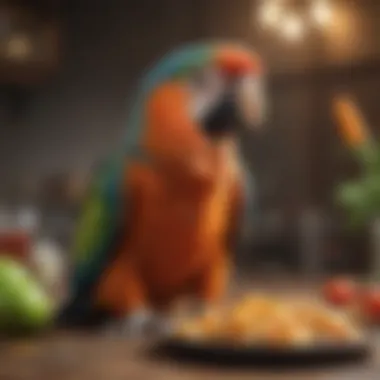

Monitoring your parrot's health through diet is crucial for ensuring they enjoy a long and vibrant life. Parrots are not just colorful companions; they're living beings requiring careful attention to their dietary habits. Just like we can't afford to overlook our eating habits, the same principle applies to our feathered friends. A well-balanced diet is the bedrock of avian wellness, influencing everything from plumage brightness to energy levels.
This section will explore the tell-tale signs of a healthy parrot and how to pinpoint nutritional deficiencies that may compromise their well-being. Equipped with this knowledge, pet bird owners can become more proactive in managing their parrot's diet, keeping them healthy and lively.
Signs of a Healthy Parrot
Understanding the signs of a healthy parrot can include more than just visually assessing its appearance. Here are some key indicators:
- Bright Plumage: A parrot with vibrant and well-groomed feathers is often a good sign of health. Dull or ragged feathers might mean nutritional deficiencies or stress.
- Active Behavior: A healthy parrot is usually energetic and inquisitive. If they aren't moving around as much, something may be off in their diet or overall well-being.
- Clear Eyes and Nostrils: Healthy parrots have bright, clear eyes and clean nostrils without discharge. Any signs of cloudiness or excretions can be an indication of potential health issues.
- Regular Droppings: The droppings of your parrot can reveal a lot about its health. Healthy droppings are typically well-formed and colorful, indicating a balanced diet. Soft or unusually colored droppings call for immediate attention.
- Vocalization: A happy parrot often engages in vocalizations and can mimic sounds or words. A sudden decrease in vocalization may suggest issues.
Keeping an eye on these aspects can take the guesswork out of monitoring your parrot’s health.
Identifying Nutritional Deficiencies
Detecting nutritional deficiencies in parrots can sometimes be challenging since symptoms might not be apparent until they become severe. However, there are certain key signs that can prompt immediate examination:
- Feather Problems: If your parrot is plucking its feathers or showing signs of excessive molting, it could be lacking essential fatty acids or protein.
- Lethargy: Noticing your parrot is less active than usual? Lethargy can stem from inadequate nutrition, leading to a lack of energy and vitality.
- Beak and Nail Issues: A lack of proper vitamins and minerals can lead to deformities in the beak and nails. Check how well-groomed they seem; dull nails or an overly soft beak might indicate deficiencies.
- Behavioral Changes: Changes in behavior, such as increased aggression or withdrawel, might be a cry for help from your parrot. They might be struggling with health issues that stem from what they're consuming.
- Obesity or Sudden Weight Loss: Monitoring your parrot's weight is key. Sudden spikes in weight could indicate improper diet, while unexpected weight loss raises red flags, pointing towards serious health threats.
If you notice any of these symptoms, it's time to dive deeper—not just into what you're feeding your parrot but into how they are responding to it. In certain cases, consulting with an avian veterinarian can prevent further complications and steer your bird back to health.
"Through careful observation of diet and behavior, you gain the insight needed to keep your parrot healthy and thriving."
In essence, maintaining a watchful eye on your parrot's health through its diet is not only necessary but also a rewarding journey in ensuring a watchful and happy partnership with your feathery companion.
Consulting with a Avian Veterinarian
Taking your parrot to see an avian veterinarian can seem like a chore, but it’s crucial for their overall well-being. Just like humans, parrots need specialized care tailored to their unique biological and dietary needs. A professional with experience in avian health will be able to identify potential health issues that an untrained eye might miss. Moreover, they provide valuable insights into nutritional requirements that might not be covered in standard pet care guides.
The benefits of regular check-ups cannot be overstated. Routine visits to the vet can catch potential issues before they become serious, ensuring your feathered friend stays happy and healthy. Beyond just assessments, vets often offer advice on the best dietary practices and can suggest specific food brands or ingredients that cater to your parrot's individual requirements.
When to Seek Professional Advice
Recognizing when to visit the vet can be a bit tricky for many parrot owners. Look out for changes in behavior or appearance. If your parrot suddenly stops eating, experiences a change in droppings, or shows unusual signs of lethargy, these could be red flags. Additionally, if you notice any changes in their feathers or skin, it might not just be molting but rather a sign of skin irritation or allergies requiring attention.
Other signs prompting a vet visit include:
- Changes in vocalization
- Excessive scratching or feather plucking
- Breathing difficulties
- Swelling in any part of the body
- Changes in urination patterns
It’s best to err on the side of caution. If in doubt, schedule a consultation. Better safe than sorry!
Questions to Ask Your Vet
When you do decide to consult an avian veterinarian, having a range of questions ready can be beneficial. Understanding your parrot's needs from a professional's point of view can make all the difference. Here are some key questions you can consider:
- What is a balanced diet for my specific type of parrot?
- Are there any specific dietary deficiencies I should be aware of?
- What fresh foods are suitable for my bird?
- How much food should my parrot be eating daily?
- Can you recommend brands of pellets or seeds?
- What are some common health issues to look out for in my species?
Being prepared for your visit can help you make the most out of your time with the vet. Not only does this establish a foundation for your parrot’s nutritional journey, but it also illustrates your commitment to their health.
Regular consultations with an avian vet can dramatically improve your parrot's quality of life by addressing dietary needs and spotting health issues early on.
Closure
In wrapping up this extensive discussion on nourishing your parrot, it's crucial to recognize the pivotal role that proper feeding plays in your bird's overall health and happiness. A parrot's diet is not just about sustenance; it can significantly impact their physical vitality, emotional well-being, and lifespan. Providing a well-rounded diet filled with variety and nutrients is key. It ensures that your feathered friend thrives, showcasing bright feathers and a playful disposition.
Summary of Key Points
To summarize, here's a quick recap of the essential elements discussed:
- Dietary Needs: Understanding what constitutes a balanced diet is vital. Parrots require a combination of seeds, fruits, vegetables, nuts, and sometimes pellets to meet their nutritional needs.
- Food Safety: Awareness of safe and toxic foods can prevent health issues. Always double-check food items before sharing with your parrot.
- Meal Prep: Proper preparation and portion control can lead to healthier feeding habits, ultimately benefiting your parrot’s health in the long run.
- Behavioral Insight: Knowing your parrot’s food preferences helps in creating a more engaging feeding routine that can enhance bonding.
- Ongoing Monitoring: Regular health assessments related to diet will pinpoint any nutritional deficiencies that may arise.
Encouragement for Ongoing Learning
As you navigate the adventurous journey of caring for your parrot, consider this an ongoing process. Avian nutrition is an evolving field, with new findings emerging that can further inform your approach to feeding. Stay curious and proactive about seeking more knowledge. Engaging with communities on platforms like Reddit can provide fresh perspectives, while forums on Facebook will connect you with fellow avian enthusiasts sharing their experiences.
In essence, continuous education not only enriches your understanding but also enhances the quality of life for your parrot. Keeping updated with timings like veterinary visits or nutritional guidelines is bound to bear fruits in terms of health and overall joy for both you and your bird.












